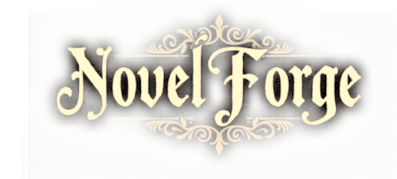


Use Word Board as your clipboard for words, sentences or entire paragraphs
You may have noticed a panel called Word Board that pops up when you click the white plus button on the Assistant window.
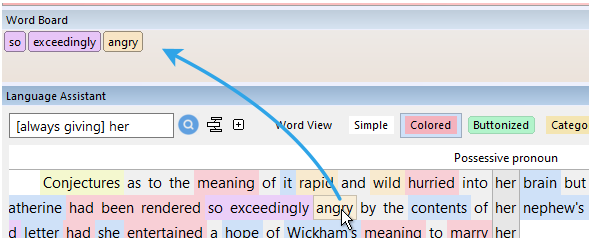
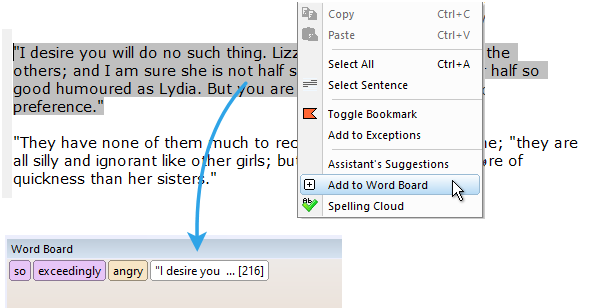
Its function is simple. When Word Board is opened, any time you
click on a word in the Assistant it will be added there.
This way you can pick (and save with the project) any number of
interesting words or entire phrases from the Assistant’s book.
Then any time you double-click on those words, they will be
inserted in the text at cursor position.
This is a great way to save scrumptiously sounding words you
may have find, without remembering what they were.
But did you know you can put words from your text there as well?
Not just that. You can save whole sentences or even paragraphs
as a sort of permanent Multi clipboard.
Just select a word or a phrase, right click and use Add to Word
Board. And boom. it will be there and it will be saved with the
project.

You can add words from Assistant to the Wordsheet as well

When you are in the Wordsheet document, you can add words from the Assistant to
the current cell by double-clicking on the word.
You can build whole sheets of words! Wordsheets!
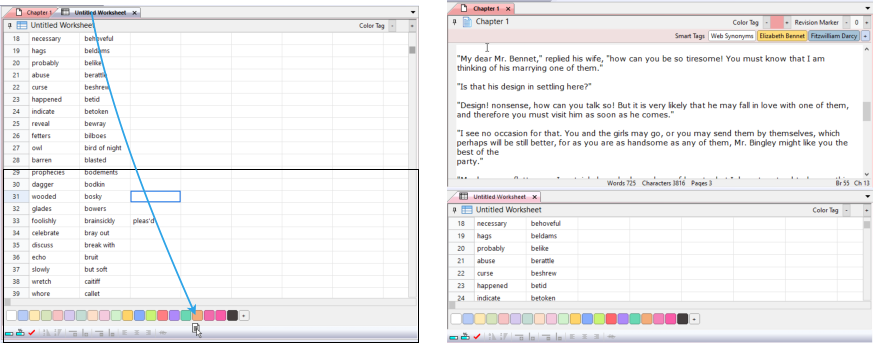
You can see more than one document at the same time
To split the view and see two documents side-by side or one below the other, drag the document tab all the way to the side or bottom.
This apply to any document and any combination of them. If you need to have two of the same type documents opened (for example Chapter 1 and
Chapter 2) see how to pin a document of the same type.
Pin a document
To prevent having a large number of tabs opened and thus creating complete chaos, each newly opened document window type will by default replace the
already existing one. By “type” we mean your document tabs on the top will have only one Text document, one Image wall, one Timeline etc...
But if you need to keep a certain document constantly open without being replaced you can pin it. For that, you have a "pin" button on each document.
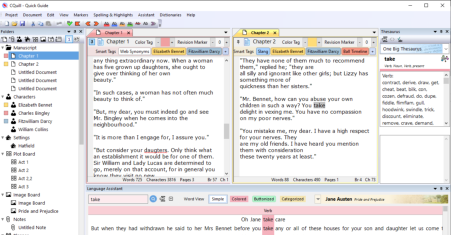

Once a document is pinned, you can open multiple document of the same type, and also put them side by side.
Wordsheets can have ranking bars and checkmarks and you can sort by them
Let's say you are trying to select the perfect pen name or a super catchy title for your book and you came up with a whole list. Use Wordsheets.
You can put a ranking bar next to each word. Just select a bunch of cells and press the Gauge button and the cells will turn into a bar that you can adjust
with a mouse.
Then you can bribe all your relatives with chocolate and Goulash to help you figure out which name sounds least ridiculous, set the ranks accordingly,
and check the web if such book already exists.
Pro Tip: You can send text from a cell directly to your browser, right-click on a cell, and use Search web from the menu - no need to copy/paste.
Then select the whole ranking column by clicking on the column header and use sort. There you are. The Banished Jewel it is. Now you need to write it.
But having the name is like 90% of work done, right?
You can put thumbnails into a dictionary
There are numerous keyword dictionaries and prompts in CQuill and you can create your own as well (see Smart Tags)
But besides of just words, you can also put little thumbnails in them.
The process is simple, just drag an image to the keyword cloud window, (you can even do it from a web browser directly), then just use it as any other
keyword.
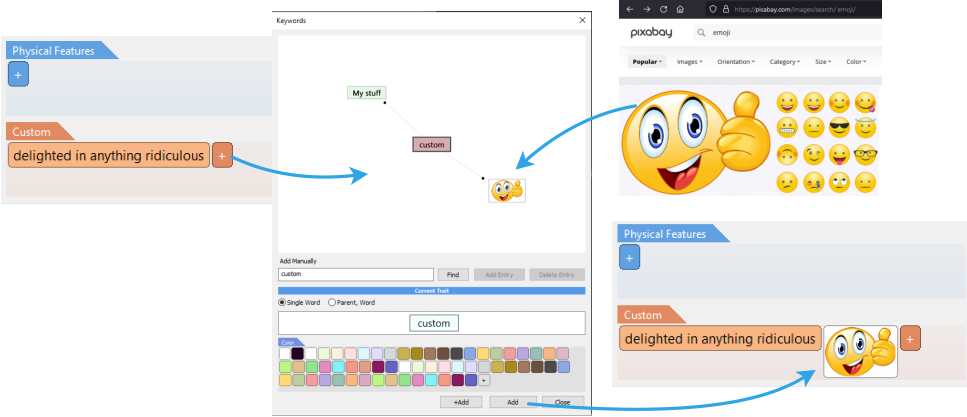
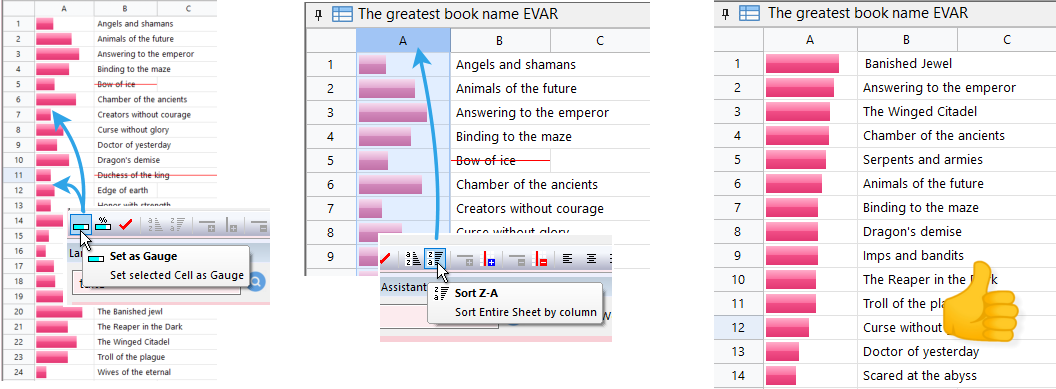
You can zoom in the text, even in wordsheet
Is the text getting smaller with time? We have the problem too. Make the text as big as you need, without distracting yourself with changing fonts or
styles.
Use Smart tags to find the relevant document(s)
Smart Tags are not just for show. Adding relevant tags to your chapters will make them very easy to find later.
It may seem trivial, but as your project grows, it will become a real issue remembering where in the book some events happened. (Especially
after you start swapping chapters around and rewriting it for the 10th time). No stones would remain unturned.
You could add tags such as Names, Places, or any other relevant info (romance, fight, etc.).
You can also use tags to put editing notes for yourself.
For example these could be the tags in one of the chapters (but which
one?) in our Sense and Spaceships
When you are adding a custom Tag to your document, add it to User Defined Tags for later, so you don’t actually need to remember even that.

You could search for any of these tags (or even lack of them). Since the ‘Fix the dialogue!’ tag was added into User Defined Tags, you don’t even need
to remember that much. All you need to do is to pick it up from the list.



Synonyms of Synonyms
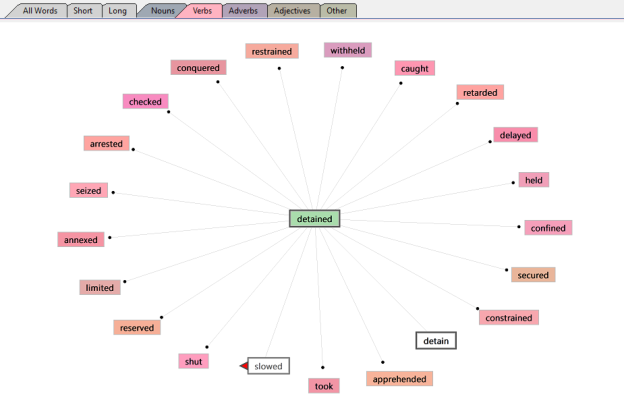
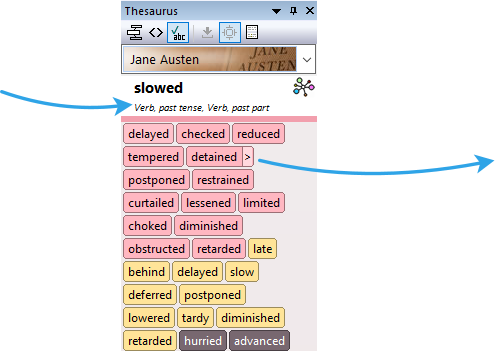
Click on the little arrow next to
any word in the Thesaurus and
it will open a word cloud
synonyms just for that word.
Click on the white part where
the main word is, and it will
open combined word cloud
with all the synonyms.




The software was “rebranded” to NovelForge

